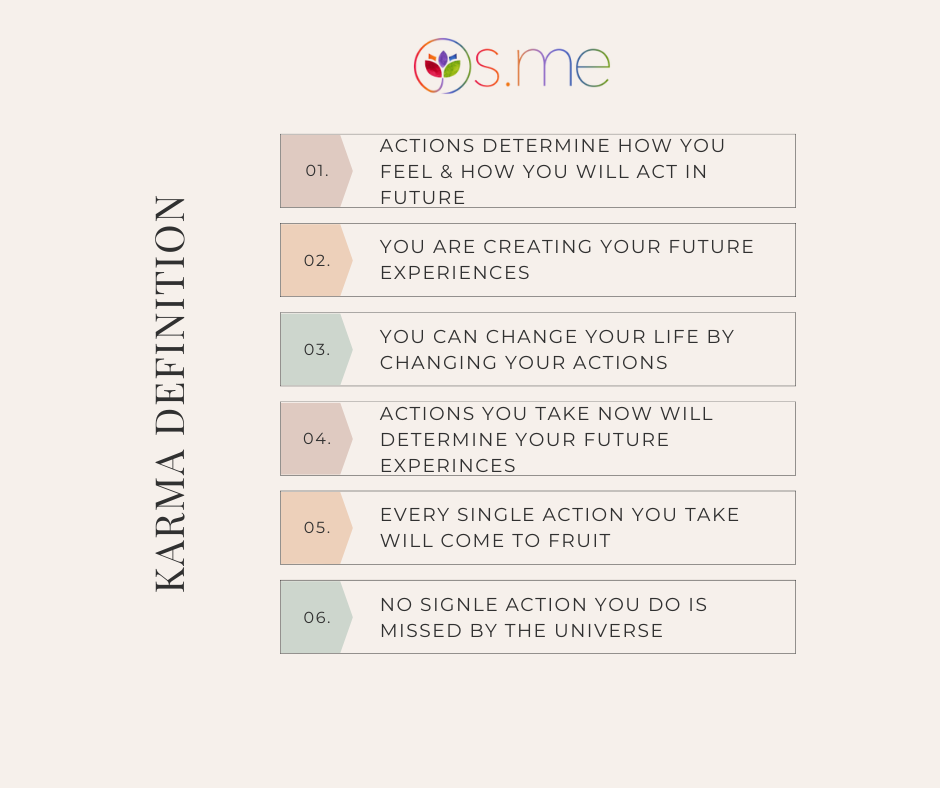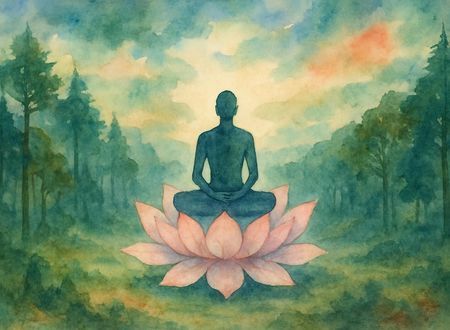
Karma Definition
It is the concept of good and bad deeds in Hinduism. It originated in ancient India as a belief that your actions would affect your fate in the next life. In Hinduism, it is the force that explains why some people go through suffering and pain while others experience happiness and joy.
However, karma is not just about fate or luck – it is also about our ability to make choices based on past experiences and future hopes.
The word कर्म (Karma) – The concept revolves around the belief that each action we take will affect our future life, either positively or negatively.
The view is that if you committed good deeds throughout your lifetime, you would be reborn into a better situation based on those good deeds upon death. Likewise, if you committed evil deeds, you would be reborn into worse circumstances because of those wrong actions taken during your lifetime. Learn more about what is karma.
Karma Definition: Destiny and free will
It is a spiritual law of cause and effect. It teaches that everything we do, good or bad, comes back to us. Karma is a Sanskrit word meaning action or activity and refers to the process whereby an individual’s balance sheet of life’s actions determines his fate or destiny in a future existence.
It influences our present and future lives by deciding what type of body we will have next time and where this new birth will occur (either as a human, animal, or plant).
It is a concept that explains how everything in the universe works together on an impersonal basis—no one created it; no one controls it; no one owns it—and there are no exceptions to its workings. All humans have free will (the ability to make choices), so they can create karma by their actions/inactions when they’re alive on earth—they cannot escape its consequences after death because karmic laws apply even after someone dies!
Karma yoga: the spiritual discipline of selfless action
Karma yoga, on the other hand, is the spiritual discipline of selfless action performed for the benefit of others and as part of one’s spiritual growth. Actions you take now will determine your future experiences in this life and future lives. You can learn more by reading about types of karma.

Bringing awareness to your speech, thoughts, and physical actions is the essence of Karma Yoga. It is practiced in many ways: through service to others (such as volunteering) or being kinder to yourself.
In addition to helping others, karma yogis also strive to master their minds by focusing on positive thoughts with an attitude of detachment from outcomes.
When you practice it—even if in any other form of dharma—you must recognize that no matter how hard you try or progress, there will always be room for improvement! Your enthusiasm and determination are essential factors to successfully cultivate positive attitudes and actions such as compassion towards all beings; however, these qualities can only take you so far if your motivation isn’t pure enough at its core.
There’s a reason why many ancient texts refer to karma yoga as an art form: it’s because, like any other discipline, it takes time and effort to master. No shortcut or magic wand can make this path easier for you; however, we are fortunate enough to have teachers and spiritual leaders who have already walked the path before us, so their guidance can help us along the way.
Swami Vivekananda’s Practice of Karma Yoga
Swami Vivekananda’s practice is a philosophy that teaches the importance of doing one’s duty without expecting anything in return. The Swami lived by this principle, devoting himself entirely to the service of others without thinking about his happiness.
Swami Vivekananda was born into a devout Hindu family but did not fully embrace Hinduism until later in life. He began his career as a professor at Calcutta University before finding religion and becoming an ordained monk under Ramakrishna Paramahansa.
No one can get anything unless he earns it. This is the eternal law. We may sometimes think that it is not so, but in the long run, we become convinced of it.
A man may struggle all his life for riches; he may cheat thousands, but he finds at last that he did not deserve to become rich, and his life becomes a trouble and a nuisance to him. We may go on accumulating physical things for our enjoyment, but only what we earn is really ours.
A fool may buy all the books in the world, and they will be in his library, but he will be able to only read those that he deserves to, and this deserving is produced by karma.
Our karma determines what we deserve and what we can assimilate. We are responsible for what we are, and whatever we wish ourselves to be, we have the power to make ourselves.
With regard to Karma Yoga, Bhagwad Gita says that it is doing work with cleverness and as a science; by knowing how to work, one can obtain great results. You must remember that all work is simply to bring out the power of the mind, which is already there, to wake up the soul.
Source: Karma Yoga: The Yoga of Action
It’s important to note that philosophy is not limited to the Hindu religion. Anyone can practice a form of karma yoga, whether religious or not; they just have to be willing to devote themselves entirely to their work without any expectation of rewards in return.
Spiritual Meaning of Karma
It is a spiritual discipline of selfless action performed for the benefit of others and as part of one’s spiritual growth. In this way, it is similar to the Western religious practice of “doing unto others,” but with a more spiritual slant.
Whether it’s something as simple as giving money to charity or something as complex as helping someone find love—an opportunity to act out our most positive nature by helping others to grow spiritually.

While there are many paths toward enlightenment, this path is unique because it asks us not only to think about how our actions affect ourselves but also how they impact those around us—and, ultimately, all beings on earth who share this planet with us.
It also asks us to consider how our actions affect the world, which we can do simply by observing the ripple effects of our decisions. For example, suppose you decide to go without meat for one day per week and donate that money toward a cause such as animal rights. In that case, you’re not only helping animals but also supporting those who work tirelessly for their protection.
It is a small example of how one action can have far-reaching effects, and this encourages us to adopt this kind of thinking in our lives. By practicing this form of yoga, we can understand the importance of every decision we make—choosing the right words to say during an argument or deciding which charity should receive the money we donate each month.
It also teaches us that nothing is out of our control. We can’t always change the world around us, but we can choose how we react to situations and how those reactions affect others. By practicing this detachment from the results of our actions, we learn how not to take things personally—and therefore find inner peace even amid chaos.
This practice can apply to any aspect of your life. It teaches us to be mindful of what we do and why we do it. By making conscious decisions about every action we take, we begin to see the interconnectedness of all things and learn how our efforts can help make the world a better place.
Definition of Karma in Buddhism
In Buddhism, it is a concept that explains how you create your own future experiences.
Definition of good karma/Definition of bad karma
There is nothing such as good karma or bad karma. You can change your life by changing your actions, and the actions you take now will determine your future experiences. A person’s actions are connected to the past and future through cause-and-effect relationships.
The consequences of an action might be delayed or immediate, but they always come back to you somehow. If we think of karma as a boomerang, it’s not just one action that comes back—it’s all of them! When the universe delivers what we deserve (good or bad), it works like this:
- The action happens in the present moment
- The results return either immediately or over time
- Those results affect our emotions, which then affect how we act in the present moment
Conclusion
Karma is a Sanskrit word that means “action.” It is used in Hinduism, Buddhism, Jainism, and Sikhism to describe the concept of “fate” and how one’s actions influence the future. In this sense, it is similar to the Judeo-Christian idea of God’s will or predestination.
Still, karma differs by asserting that all living beings have free will to work on themselves and improve their karmic balance by performing good deeds throughout their existence on earth. The word karma comes from the root “Kri,” which means “to do” or “to act.”









Comments & Discussion
1 COMMENTS
Please login to read members' comments and participate in the discussion.